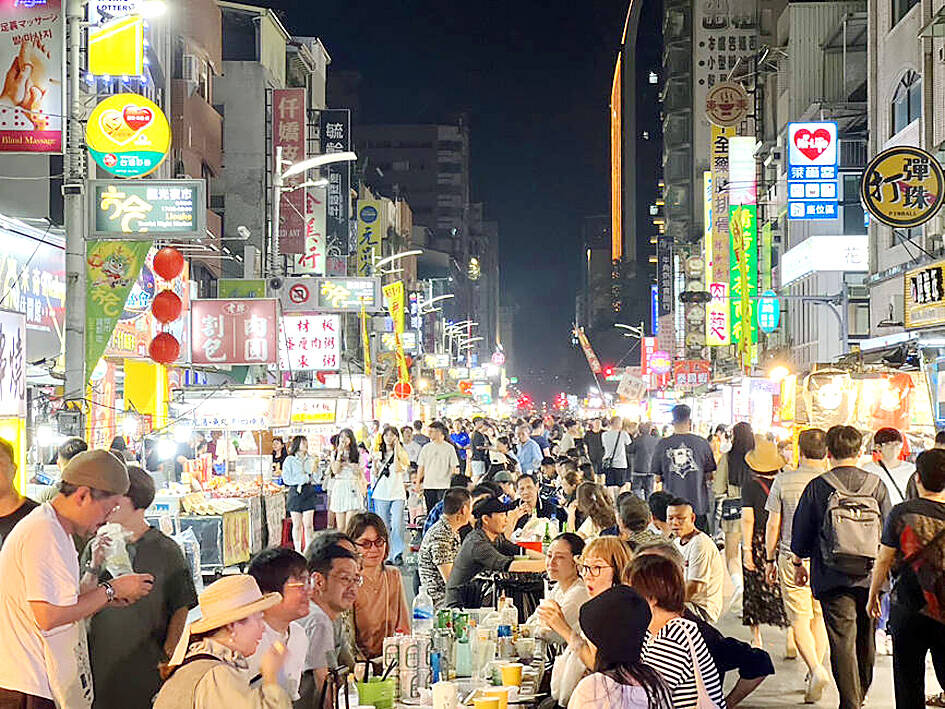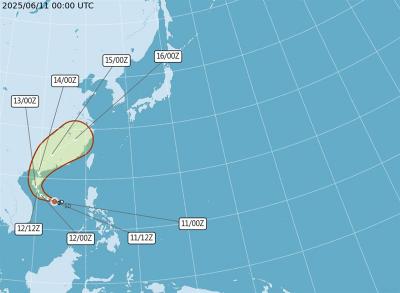A joint study conducted by university researchers in Kaohsiung showed that pollutants generated by businesses in night markets not only affect the indoor air quality of nearby households, but also damage children’s lungs.
The study was conducted by a nine-person research team led by National Sun Yat-sen University Institute of Environmental Engineering professors Lin Yuang-chung (林淵淙) and Chen Pei-shih (陳培詩). Chen is also a Kaohsiung Medical University Department of Public Health professor.
The research was the first in Asia to explore the causal relationship between night market activities and children’s health. Its results were published in the Journal of Exposure Science and Environmental Epidemiology in March.

Photo: Ge You-hao, Taipei Times
Night markets are cultural venues that are unique to Taiwan and other Asian countries, but there had not been a study that examined how suspended particulate matter and gaseous pollutants created through night market activities affected the health of people who live near them, Lin said.
The research team used real-time monitoring equipment to measure concentrations of PM1, PM2.5, PM10, carbon dioxide, carbon monoxide, nitrogen dioxide, sulfur dioxide, ozone, total volatile organic compounds (TVOC), airborne bacteria and fungi in 58 households near a night market. It also assessed the lung function values of children living in these households.
The team found that PM1 and PM2.5 concentrations were significantly higher during opening days of the night market than when it is closed. The lung function values of children within 595m from the market, or the “near” group, were also significantly lower than those who lived 595m farther from the market (the “far” group).
There were also higher levels of carbon dioxide, carbon monoxide, sulfur dioxide, TVOC and PM10 in the “near” group households, the study showed.
The most crucial finding is that, even after excluding variables such as incense burning, smoking and cooking, children living near the night market showed lower vital capacity and forced expiratory volume in one second than those residing farther away.
The study showed that air pollutants released through night market activities enter nearby houses and could have negative effects on the development of children’s respiratory system, the researchers said.
Long-term exposure to high-density particulate matter and gaseous pollutants could increase the risks of children contracting respiratory diseases and hinder the healthy growth of their lungs, the team said.
The research team advised people living near night markets to adopt measures to reduce health risks, including reducing the frequency of opening their windows when night markets are open and using air purifiers equipped with a filtration system.
Children should also avoid extended periods of outdoor activity when night markets are open, it added.
“Maintaining proper distance between night markets and residential areas should be taken into consideration in future urban renewal projects,” the researchers said.
“Vendors in night markets should also be required to use air-purifying equipment and low-pollution cooking methods, while residents living near them should be educated about protecting themselves from air pollution-related health risks,” they said.

A magnitude 6.4 earthquake struck off the coast of Hualien County in eastern Taiwan at 7pm yesterday, the Central Weather Administration (CWA) said. The epicenter of the temblor was at sea, about 69.9km south of Hualien County Hall, at a depth of 30.9km, it said. There were no immediate reports of damage resulting from the quake. The earthquake’s intensity, which gauges the actual effect of a temblor, was highest in Taitung County’s Changbin Township (長濱), where it measured 5 on Taiwan’s seven-tier intensity scale. The quake also measured an intensity of 4 in Hualien, Nantou, Chiayi, Yunlin, Changhua and Miaoli counties, as well as

Taiwan is to have nine extended holidays next year, led by a nine-day Lunar New Year break, the Cabinet announced yesterday. The nine-day Lunar New Year holiday next year matches the length of this year’s holiday, which featured six extended holidays. The increase in extended holidays is due to the Act on the Implementation of Commemorative and Festival Holidays (紀念日及節日實施條例), which was passed early last month with support from the opposition Chinese Nationalist Party (KMT) and Taiwan People’s Party. Under the new act, the day before Lunar New Year’s Eve is also a national holiday, and Labor Day would no longer be limited

COMMITMENTS: The company had a relatively low renewable ratio at 56 percent and did not have any goal to achieve 100 percent renewable energy, the report said Pegatron Corp ranked the lowest among five major final assembly suppliers in progressing toward Apple Inc’s commitment to be 100 percent carbon neutral by 2030, a Greenpeace East Asia report said yesterday. While Apple has set the goal of using 100 percent renewable energy across its entire business, supply chain and product lifecycle by 2030, carbon emissions from electronics manufacturing are rising globally due to increased energy consumption, it said. Given that carbon emissions from its supply chain accounted for more than half of its total emissions last year, Greenpeace East Asia evaluated the green transition performance of Apple’s five largest final

The first tropical storm of the year in the western North Pacific, Wutip (蝴蝶), has formed over the South China Sea and is expected to move toward Hainan Island off southern China, the Central Weather Administration (CWA) said today. The agency said a tropical depression over waters near the Paracel and Zhongsha islands strengthened into a tropical storm this morning. The storm had maximum sustained winds near its center of 64.8kph, with peak gusts reaching 90kph, it said. Winds at Beaufort scale level 7 — ranging from 50kph to 61.5kph — extended up to 80km from the center, it added. Forecaster Kuan Hsin-ping